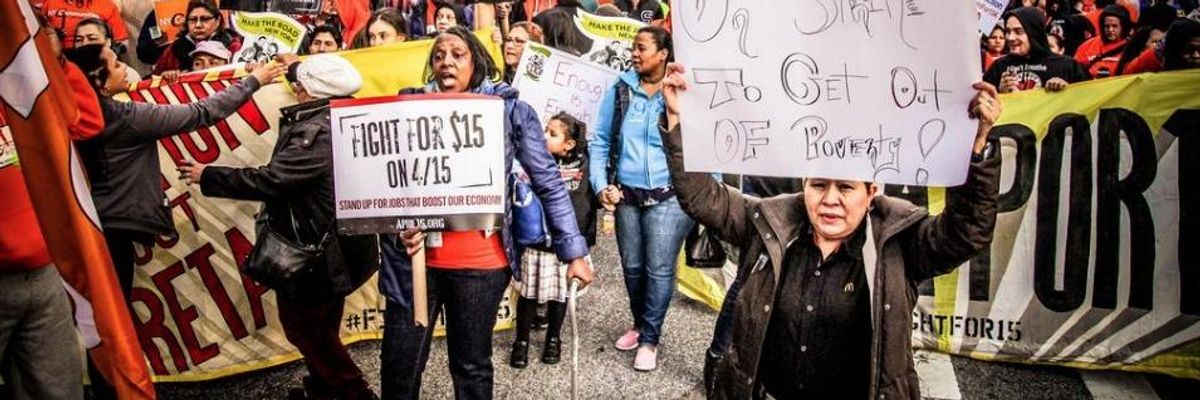A few weeks ago, people working at McDonald's filed several complaints that detailed the dangerous accidents and severe burns they've suffered while on the job, citing company management's policies to work quickly without protective gear or training. Of course, the injuries that the complainants describe were preventable, but it would require McDonald's and its franchisees to treat employees as human beings worth protecting. Their scars are more painful reminders of how giant corporations are burning low-wage workers and our communities.
The pressure-cooking job conditions people working at McDonald's described are not unique to the Golden Arches. I've met men and women from all walks of life who are working fast and furiously and with little reward. For far too long, we've allowed profitable corporations to ignore the basic well-being and needs of everyday Americans. Even as the cost of living goes up, wealthy CEOs have been hell-bent on keeping wages down, pocketing almost everything their employees produce for the company. This leaves our friends and neighbors who work for these incredibly profitable corporations living on the brink.
But this week, fast-food workers are going on strike to protest unsafe jobs and unfair pay. This time, they will be joined by Walmart associates and other retail employees, as well as caregivers, adjunct professors, and others who have had enough of working and still not being able to make ends meet. On April 15, they're using their collective voice to demand a better economic system - one that provides families with decent jobs and a starting wage of $15 an hour.
Yes, I said $15 an hour. Not $9, and not $10. These strikes were started by fast-food cooks and cashiers, but the movement has grown, and the response has been quite telling. Recently, Walmart, McDonald's, Target and The Gap have all responded to workers' demands, announcing moves to increase wages and some benefits for some of their workforce. Unfortunately, these minor wage hikes won't put enough money in people's pockets to pay the bills and take care of their families.
And when jobs don't pay enough, workers turn to critical public assistance in order to meet their basic needs. A new study from the Labor Center at the University of California Berkeley finds that states are spending $25 billion per year on public assistance programs provided to working families. If you have a job, you shouldn't need to rely on public assistance. But the people who help you pick out shoes or an outfit for your kids can't access enough hours to even cover their rent. The workers taking care of our grandparents don't even get overtime pay. And there are adjunct professors at some of our country's largest educational institutions who are living in their cars.
Even if you haven't experienced working in a minimum wage job, you should join together with the men and women taking on these profitable corporations. Certainly, these companies can afford to create jobs that pay people enough to actually live on, but nearly two-thirds of American households earn less money today than they did in 2002, despite the fact that corporate profits are at an all-time high. Moreover, you're the one bearing the costs of these low-wage jobs, because these employers offset wages and benefits onto taxpayers in the form of public assistance. So even if you never stop at a Wendy's or Taco Bell drive-thru, or you won't set foot in a Walmart, you're still picking up the tab for these companies' cheap labor.
Thankfully, there are several legislative initiatives emerging to hold CEOs of major corporations accountable for refusing to pay family-sustaining wages, denying basic benefits, and shifting their responsibilities onto taxpayers. For example, in Connecticut, a proposal for a Low-Wage Employer Fee would fine large companies that pay employees less than $15 per hour. The money recovered from the fee would fund critical early childhood education and healthcare services for low-income families, many of whom work for these big corporations.
Policies such as this one aim to level the playing field--to help right the dangerous imbalance in our economy and ensure that if you do well in America, you do right by America. If we don't stand up with those who are protesting this week, greedy corporations are going to continue to burn all of us, employees and taxpayers alike. But if we stand up together, we are heard. We are taken seriously. We make change happen.

